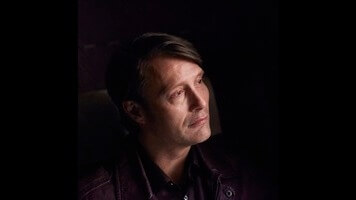Hannibal: “Antipasto”

Bonsoir, Hannibal.
I missed you.
“Antipasto” is one of Hannibal’s more dreamy episodes, playing with temporality and dreamscape in ways that few other shows even attempt. It’s a beautiful episode that answers many questions about Bedelia and Hannibal’s relationship, while bringing up so many more. For a show that ended its last season in a cliffhanger, few of the basic questions are left untouched. Who made it out of last season’s bloodbath? But Hannibal is rarely concerned with those basic facts. This is a world, remember, where a frail old man can construct a totem pole made of corpses with no help from anyone more able-bodied and a murderer can sit down for dinner with a man he killed long ago to have a conversation about his very nature. Instead, it is more concerned with creating a feeling. And in “Antipasto,” that feeling is terror.
Like the episode title suggests, this is the appetizer before the main courses begin.
If you haven’t read Entertainment Weekly’s interview with creator Bryan Fuller about his insistence on staying away from sexual horror as a part of the show’s fabric, I implore you to. Hannibal is about a body and psychological horror of another kind. To dominate through sexual force would be too easy for Hannibal. He only uses sex and lust as a means of further manipulation. He prefers to take the agency of his playthings away in other, more complicated ways. Brute force is not his game. That says a lot about his relationship with Bedelia, who is not at his mercy because he can overpower her but because he controls her mind, not her body. He does not force her to take part in his killing. He only asks if she is willing to participate with him. When Hannibal asks Bedelia how she’s doing, she responds, “I still believe I’m in conscious control of my actions. Given your history, that’s a good day.” This where Hannibal differs from other copycats. The murders he commits aren’t what is so terrifying about Hannibal. It’s his manipulative psychology. He’s something far more sinister. Really, it’s never that kind of party for Hannibal, unless he has an upper hand to gain. It will be interesting to see how this is deal with when it comes to the Francis Dolarhyde, aka the Tooth Fairy or Red Dragon (to be played by The Hobbit’s Richard Armitage), who will act as another villain, much like Mason Verger (who will also return) did last season.
Bedelia and Hannibal have ended up in Florence (with a short Parisian detour), where Hannibal has taken a job as a lecturer on Dante, much like he does in the Hannibal novel. It’s standing in front of the backdrop Gustave Dore’s depiction of Satan in the Divine Comedy that he threatens Bedelia most explicitly, discussing the nature of betrayal in relation to Pietro della Vignia (fans of the Thomas Harris novels will likely recognize Hannibal’s lectures from the Hannibal novel, as well). “I made my home by my gallows,” Hannibal says, almost to Bedelia exclusively, as if he knows she sits at the train station, directly in front of a camera. Hannibal has a hold of Bedelia beyond his lecture-based threats. He poses himself as her salvation when her patient ends up dead — the circumstances of which are not yet entirely clear (also, eagle-eyed viewers will note that her dead patient is Zachary Quinto). Hannibal does not need to threaten Bedelia with sexual violence. He has already taken her agency away.
Hannibal exists in this strange world. I don’t doubt that Hannibal could lecture on Dante to an unforgiving audience and win them over, but I do think it’s odd that the internet does not seem to exist, and that the only potential hole in his plan is a poet-TA who made the mistake of striking up a conversation with the wrong guy at a party. But, once again, Hannibal exists in a dreamworld where something like the internet has not been a factor before, so it does not bother me so much that the real Dr. Fell has no digital footprint that would include, say, his picture. Bedelia almost answers for this: “You no longer have ethical concerns, Hannibal. Only aesthetical ones.”
The concern with the aesthetic has been Hannibal calling card since the beginning, and they are particularly gorgeous in this episode (Hannibal and Bedelia’s Florentine apartment is particularly amazing). Seeing Mads Mikkelsen’s face in black and white makes him look like a marble statue, and even Gillian Anderson herself—all angles and iciness—looks like her own work of art. Drops of blood were of particularly note in “Antipasto,” as they have before, like water droplets have been throughout the series.
And while “Antipasto,” was a stellar start to the third season, Dr. Abel Gideon brings up a good point: Hannibal would rather be at the table with Will Graham, who will presumably join Hannibal for dinner next week.
Stray observations:
- Recipe of the week: The Art of Antipasti
- It makes sense that Hannibal goes international, not just because of the source material, but because it is Gaumont International production, a fact that has probably kept the perennially low-rated show alive. Also, let’s be honest, Florence is a little bit prettier than Baltimore.
- “Dante wrote that fear is almost as bitter as death.” “Dante wasn’t dead when he wrote it.”
- God, I love how funny this show can be: “Is it that kind of party?” “It isn’t that kind of party.” “It really isn’t.”